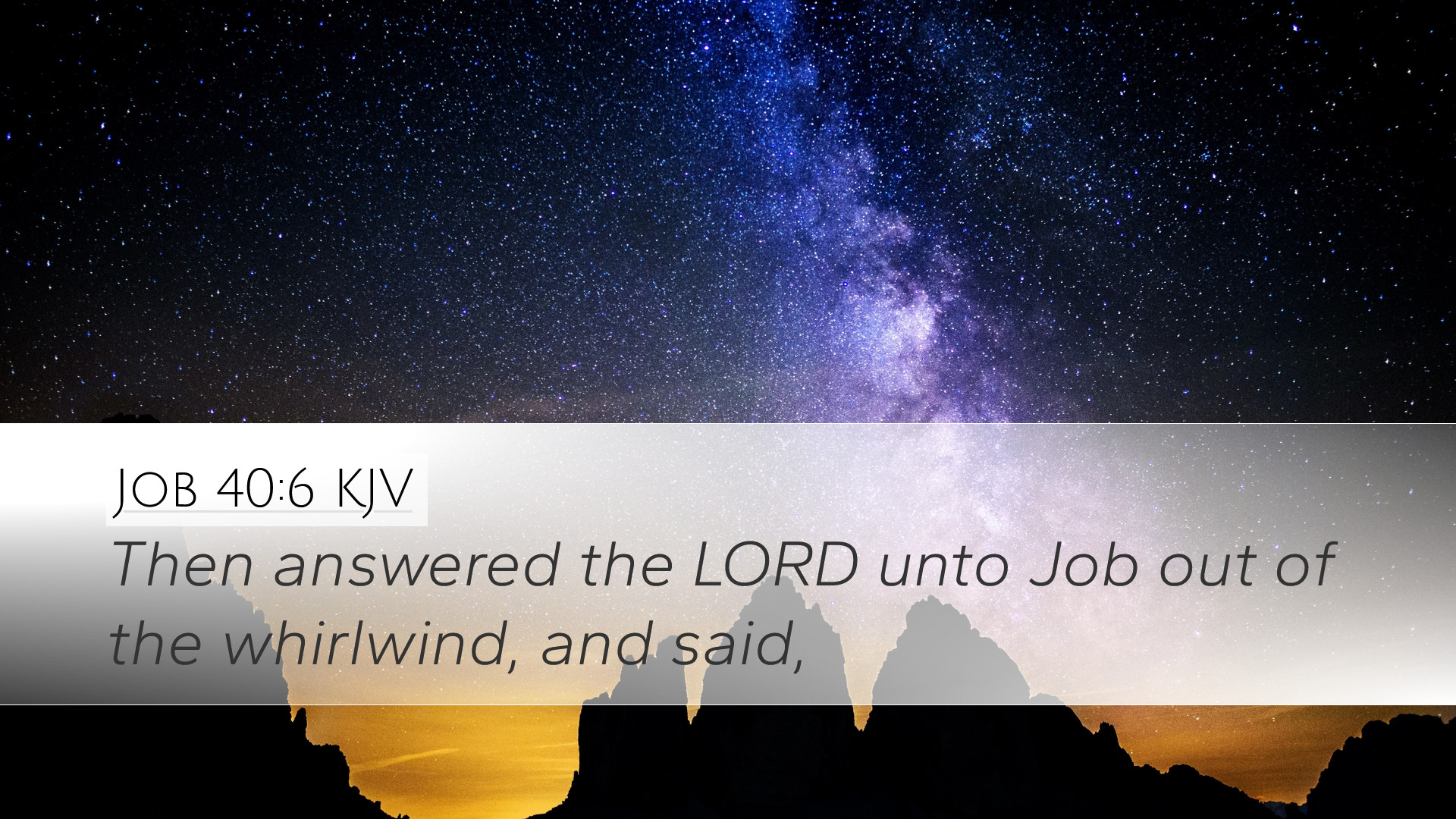Old Testament
Genesis Exodus Leviticus Numbers Deuteronomy Joshua Judges Ruth 1 Samuel 2 Samuel 1 Kings 2 Kings 1 Chronicles 2 Chronicles Ezra Nehemiah Esther Job Psalms Proverbs Ecclesiastes Song of Solomon Isaiah Jeremiah Lamentations Ezekiel Daniel Hosea Joel Amos Obadiah Jonah Micah Nahum Habakkuk Zephaniah Haggai Zechariah MalachiJob 40:6
Job 40:6 KJV
Then answered the LORD unto Job out of the whirlwind, and said,
Job 40:6 Bible Commentary
Commentary on Job 40:6
Text of Job 40:6: "Then answered the LORD unto Job out of the whirlwind, and said,"
Introduction
The passage in Job 40:6 represents a pivotal moment in the dialogue between Job and God. It indicates the transition from human discourse, filled with doubt and challenge, to divine revelation. This commentary will explore the implications of God's response to Job, elucidating insights from revered public domain commentaries.
God's Response - A Call to Reverence
Matthew Henry observes that God's reply came "out of the whirlwind," signifying His majesty and power. This imagery illustrates that while Job has engaged in an earnest plea for understanding and justice, God approaches with divine authority, demanding reverence.
Henry notes that the whirlwind represents God’s mysterious ways and nudges the reader to recognize the limits of human understanding when faced with divine omnipotence. Rather than providing Job with answers, God begins to highlight the grandeur of creation, prompting Job to reflect on his own finite nature.
Job's Predicament - A Deeper Examination
Albert Barnes emphasizes the context of Job’s suffering, acknowledging that Job had expressed his grievances and longed for an audience with God. In this moment, God shifts the conversation from Job’s condition to a broader examination of divine order and governance of the universe.
Barnes articulates that the whirlwind symbolizes more than just God's voice; it is also an indication of the turbulence in Job's own life, suggesting that divine intervention often emerges amidst chaos. This reaffirms the principle that God’s ways are beyond human comprehension, an essential theme throughout the Book of Job.
Theological Implications
Adam Clarke delves into the theological implications of God’s approach. He notes that by speaking out of a whirlwind, God is asserting His power and sovereignty. Clarke suggests that this moment serves as a reminder to all believers of God’s ultimate authority over creation. Job's misplaced focus on his own suffering is redirected toward the broader picture of God’s justice and design.
Clarke further enhances this view by suggesting that God's intention is not to dismiss Job's suffering but to reframe it in light of the Creator's grand design. This sets a precedent for understanding human suffering within the framework of divine purpose—inviting believers to trust in God’s sovereignty even when circumstances seem unjust.
The Nature of Divine Communication
In this encounter, God's choice to speak from the whirlwind implies that divine communication often comes in ways that may initially seem overwhelming or inscrutable. Henry’s analysis stresses that God often operates beyond human expectations, using the elements of nature to reflect His will and intentions. This serves as a reminder for believers to remain open to God’s voice in various life circumstances.
Human Limitations and Divine Sovereignty
This passage underscores a significant theme within Job—the dichotomy of human limitation versus divine sovereignty. Barnes expresses that Job’s assertions of righteousness pale when juxtaposed against God’s immense power. The response of God invites Job, and by extension all humanity, to recognize their limitations and the vastness of divine wisdom.
The challenge to human understanding is vividly illustrated in the next portions of God’s discourse where He begins to ask Job questions about creation, urging him to contemplate matters beyond his grasp.
The Call for Humility
Adam Clarke further argues that Job’s confrontation with God serves to cultivate humility. The whirlwind symbolizes the great and terrible aspects of God's majesty, an aspect that must be acknowledged by those who seek to understand their place in the divine order.
Humility becomes essential for worship and submission to God. Job's initial queries are met with challenges that foster a spirit of awe and reverence, setting the stage for profound learning and spiritual growth.
The Beginning of Transformation
This section of Job is the commencement of Job’s transformation—a pivotal shift where he begins to perceive the enormity of God’s creation and his own smallness. Matthew Henry posits that the answers Job sought may not always address human suffering directly, but instead bring a broader understanding of faith and trust in God's plan.
The transformation is not only personal for Job but serves as a universal message about the posture of believers in the face of adversity—turning from self-centered inquiry to an reverent acknowledgment of the divine mystery.
Conclusion
Job 40:6 is a profound reminder of the complexity of divine communication and the necessity of reverent humility before God. In this brief yet weighty statement, God emerges from the whirlwind, challenging Job and all of humanity to reflect on the nature of existence, creation, and the divine order.
This passage invites pastors, students, theologians, and scholars alike to engage deeply with the text, fostering a richer understanding of God’s sovereignty and the framework within which human suffering can be contextualized. Hence, it propels believers toward a more profound worship characterized by awe and reverence for the Creator, who governs the whirlwind of life with wisdom beyond measure.


